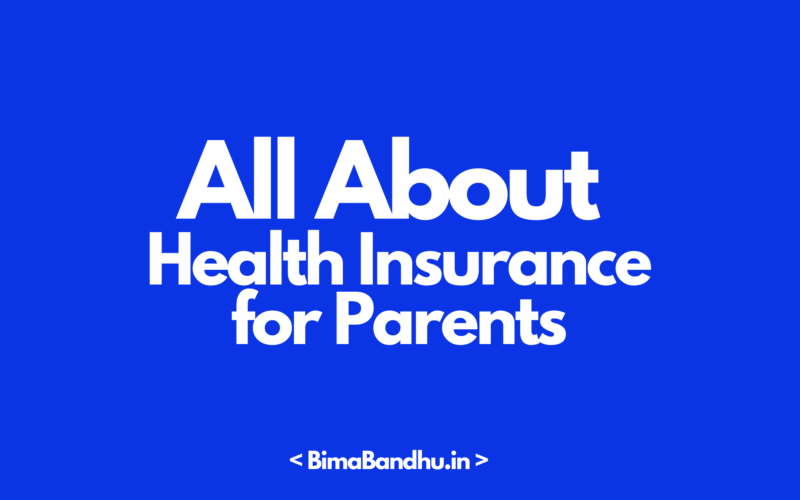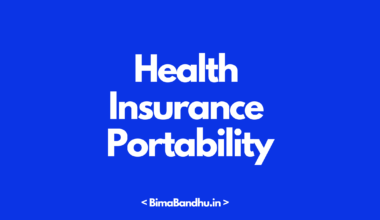In the hustle and bustle of your daily life, it is easy to overlook the precious moments you share with your parents. They have been your pillars of strength, guiding you through life’s challenges with unwavering support and unconditional love. As they gracefully age, it becomes your responsibility to ensure their well-being and comfort. One of the most crucial ways to do so is to buy health insurance for parents in India.
As we all know, life is unpredictable, and health issues can arise without warning. The rising cost of medical treatment in India can be a burden on any family, especially senior citizens who may need frequent medical attention. In such circumstances, the best health insurance for parents acts as a guardian angel to provide financial security and peace of mind when it matters the most.
While you often plan for your future financial goals, safeguarding the health of your parents tends to take a back seat. However, this neglect can lead to significant consequences, both emotionally and financially. Having health insurance for parents in India in place ensures that they receive the best possible medical care without the added stress of managing exorbitant medical bills.
The journey of finding the right health insurance plans for parents can be daunting, with various options, policies, and insurers to choose from. But fear not! We will take you through a comprehensive guide to health insurance for parents in India, covering everything you need to know to make an informed decision.
From understanding the different types of health insurance plans available to selecting the right health insurance policy for parents that suits their needs – we’ve got you covered. Additionally, we’ll also shed light on the claims process and valuable tips to maximize the benefits of your parents’ health insurance coverage.
Before we delve into the nitty-gritty, let’s reiterate the significance of investing in health insurance for parents. It is not just a financial decision but an expression of love and care that ensures that they receive the care they deserve during their golden years.
What is Health Insurance For Parents in India?
Health insurance for parents in India is a specialized type of health insurance designed to cater to the healthcare needs of senior citizens, typically aged 60 years and above. As your parents age, they may face an increased risk of health issues and medical expenses. The right health policy for parents provides financial protection and support during times of illness or medical emergencies.
In essence, health insurance for parents above 50 or 60 years of age works similarly to regular health insurance plans, but with some specific considerations for the elderly. The policyholder (usually an adult child) pays a premium to the health insurance company, and in return, the insurer provides coverage for various medical expenses incurred by his/her insured parents.
Here’s how a health insurance policy for parents typically works:
- These plans cover a range of medical expenses, including hospitalization costs, pre and post-hospitalization expenses, ambulance charges, day-care treatments, and more. The extent of coverage and inclusions varies based on the specific policy chosen.
- The premium for health insurance is influenced by factors such as the age of the insured parents, their medical history, chosen sum insured (coverage), and other features of the policy. Generally, premiums for health insurance for senior citizens are higher due to the increased health risks associated with age.
- Pre-existing medical conditions, if any, are typically covered after a waiting period. It’s essential to disclose pre-existing conditions at the time of purchasing the policy to avoid claim rejection later.
- Many health insurance plans for parents offer cashless treatment facilities at network hospitals. The insured can avail of medical services without paying upfront, as the insurer settles the bill directly with the hospital, subject to policy terms.
- In case of hospitalization or medical treatment, the policyholder needs to inform the insurance company within the specified time frame. After providing the necessary documents and fulfilling claim requirements, the insurer processes the claim for reimbursement or cashless treatment.
- Health insurance plans for parents usually come with lifelong renewability options, ensuring continuous coverage throughout their lifetime.
The primary goal of health insurance for parents above 60 is to ease the financial burden on the family and ensure that the elderly receive timely medical attention without compromising on the quality of healthcare. It offers peace of mind and security, allowing adult children to focus on providing the best care and support to their aging parents.
It’s important to note that different insurance companies offer various health insurance plans with varying features and benefits. As such, it’s essential to compare policies, understand the terms and conditions, and choose a plan that best suits the healthcare needs and budget of the parents.
Also Read: What is Health Insurance Deductible?
Why Do You Need The Best Health Insurance for Your Parents in India?
Investing in the best health insurance for parents in India is a decision that can significantly impact their well-being and your family’s financial security. Here are several compelling reasons why it’s crucial to provide your parents with comprehensive health insurance coverage:
- Rising healthcare costs
Healthcare expenses in India have been steadily increasing. As individuals age, the likelihood of facing medical issues also rises. Selecting the best health insurance plan ensures that your parents will have access to quality medical care without being burdened by exorbitant medical bills.
- Financial protection
Medical emergencies can strike at any time, and the costs associated with hospitalization, surgeries, or treatments can be substantial. Health insurance provides a financial safety net, preventing your family’s savings from being depleted and offering peace of mind during challenging times.
- Tailored coverage
The best health insurance plans for parents are designed to meet the specific needs of senior citizens. They often include coverage for age-related illnesses, pre-existing conditions, and preventive healthcare services to ensure comprehensive protection for your parents’ health.
- Timely medical attention
With health insurance in place, your parents can seek medical attention promptly, without delays due to financial constraints. Early intervention and timely treatment can make a significant difference in managing health conditions effectively.
- Access to quality healthcare
A robust health insurance policy enables your parents to access a network of hospitals and healthcare providers. These network facilities are often renowned for their expertise in treating senior citizens and may offer specialized care for various age-related ailments.
- No Claim Bonus (NCB) benefit
Most health insurance plans offer NCB benefit, wherein the insured receives a bonus in the form of increased coverage or reduced premiums for claim-free years. This incentive encourages your parents to maintain a healthy lifestyle and avoid unnecessary claims.
- Tax benefits
The premiums paid for health insurance policies for parents are eligible for tax deductions under Section 80D of the Income Tax Act. Utilizing these tax benefits can help in optimizing your tax liabilities while safeguarding your parents’ health.
- Lifelong renewability
Most health insurance plans for parents often come with lifelong renewability options that allow your parents to remain covered even during their advanced age when they might need medical care the most.
- Emotional well-being
Having the best health insurance for parents provides emotional reassurance, knowing that you are taking proactive steps to ensure their health and well-being. It reflects your care and affection towards them, which can be a source of comfort for both you and your parents.
Also Read: What is Copay in Health Insurance?
What is Covered Under Health Insurance Plans for Parents?
Health insurance for parents in India offers comprehensive coverage to address the unique healthcare needs of senior citizens. While the specific coverage may vary depending on the insurer and the plan chosen, here are some of the common inclusions of these insurance plans:
- Hospitalization expenses to cover the cost of hospitalization, including room charges, nursing expenses, ICU charges, and doctor’s fees during the hospital stay
- Pre and post-hospitalization expenses incurred before and after hospitalization, such as diagnostic tests, consultation fees, and medication, are usually covered for a specific period (usually 30 to 60 days) before and after hospitalization
- Day-care treatments coverage to cover expenses related to specific day-care treatments and procedures that do not require a 24-hour hospital stay
- Ambulance charges for transporting the insured to the hospital if needed
- Pre-existing conditions coverage after a waiting period
- AYUSH treatments like Ayurveda, Yoga, Naturopathy, Unani, Siddha, and Homeopathy
- Organ donor expenses to cover medical expenses for organ transplantation, including the donor’s treatment costs
- Room rent limit for room charges based on the sum insured
- NCB for claim-free years
- Restoration benefits to restore the coverage for subsequent claims in case the sum insured is exhausted during the policy year due to claims
- Domiciliary hospitalization expenses incurred for medical treatment at home that would have otherwise required hospitalization
Also Read: All About the Top 10 Health Insurance Companies in India
What is Not Covered Under Health Insurance Plans for Parents?
While health insurance plans in India offer comprehensive coverage for various medical expenses, there are certain exclusions and limitations that policyholders should be aware of. These exclusions are aspects of healthcare that are typically not covered under standard health insurance plans for parents. It’s essential to understand these limitations to avoid any surprises when making claims.
Here are some common exclusions:
- Pre-existing conditions
- Specific illness with a waiting period (which means expenses related to those illnesses will not be covered until the waiting period is over)
- Cosmetic procedures done for aesthetic reasons, not medically necessary
- Non-medical expenses incurred for non-medical items or services like personal comfort items, cosmetic products, and convenience items
- Unproven treatments or therapies that have not been proven effective or approved by medical authorities
- Some alternative or experimental treatments, except for specified AYUSH treatments covered by the policy
- Congenital conditions or birth defects that existed at birth
- Injuries from hazardous activities such as extreme sports or adventure activities
- Maternity and fertility treatments unless specifically mentioned in the policy
- Treatment expenses related to HIV/AIDS or related illnesses
It’s important to read and understand the policy terms, inclusions, and exclusions carefully. Different health insurance plans may have specific limitations on coverage, waiting periods for certain treatments, and exclusions for specific illnesses or medical conditions. Moreover, different insurers may offer additional benefits and features, so comparing policies and selecting the one that best suits your parents’ healthcare needs is essential.
Also Read: Do You Need 1 Crore Health Insurance?
How to Compare Health Insurance Plans for Parents?
Comparing health insurance plans for parents is a crucial step in making an informed decision and selecting the most suitable policy. Here’s a step-by-step guide on how to compare health insurance for parents in India:
Step 1: Assess your parents’ healthcare needs
Begin by evaluating your parents’ specific healthcare needs, considering their age, medical history, and any pre-existing conditions. Take note of the treatments, medications, and healthcare services they may require in the near future.
Step 2: Look for adequate coverage and benefits
Look at the coverage and benefits offered by different health insurance plans. Check if the plans cover hospitalization, pre and post-hospitalization expenses, day-care treatments, ambulance charges, and other essential medical services relevant to your parents’ health.
Step 3: Select the right sum insured
The sum insured refers to the maximum amount the insurer will pay for medical expenses. Ensure the sum insured you select will be sufficient to cover potential healthcare costs without straining your finances.
Step 4: Check the waiting periods
Check the waiting period for pre-existing conditions and specified illnesses. A shorter waiting period can be beneficial if your parents have existing health conditions.
Step 5: Consider co-payment and sub-limits
Review co-payment requirements and sub-limits, which determine the portion of expenses you must bear and any capped limits on certain treatments or services.
Step 6: Check network hospitals
Verify the list of network hospitals tied up with the insurance provider. Having a good network of hospitals in your city or region ensures easy access to quality healthcare.
Step 7: Evaluate premiums
Compare premium amounts for different health insurance plans. While a lower premium might seem attractive, also consider the coverage and benefits offered at that price point.
Step 8: Ask about policy renewal and renewability
Ensure that the policy has lifelong renewability, allowing your parents to continue with the coverage as they age without interruption.
Step 9: Add additional riders if needed
Evaluate the availability of add-on covers or riders that can enhance the policy’s coverage for specific needs, such as critical illness cover or maternity benefits.
Step 10: Check the insurer’s reputation
Research the reputation and claim settlement record of the insurance provider. A reliable insurer with a good track record ensures a smooth claim process when required. You can also read customer reviews and feedback online to understand the experiences of policyholders with the insurer and its services.
Step 11: Go through the policy terms and conditions
Read and understand the policy document thoroughly, paying attention to the terms and conditions, to avoid any surprises later.
How to Buy a Health Insurance Policy for Parents?
You can purchase health insurance for parents through various channels, including offline, online, and through aggregators. Here’s a guide on how to buy health insurance through each of these methods:
Offline purchase
Here are the steps involved to buy a health insurance policy for parents offline:
- Begin by researching different health insurance policies available in the market for parents. Approach insurance agents or visit the offices of various insurance companies to gather information about their plans, coverage, and benefits.
- Seek assistance from an insurance agent or broker who specializes in health insurance. Share your parents’ healthcare needs and requirements, and the agent will suggest suitable plans from different insurers.
- Complete the required paperwork, which may include filling out proposal forms and submitting relevant documents. The agent will guide you through the application process.
- Pay the premium amount through cash, cheque, or demand draft as per the insurer’s payment options.
- After completing the formalities and payment, the policy documents will be issued by the insurance company, providing details of the coverage and terms.
Online purchase
- Use official insurers’ websites to compare various health insurance plans for parents. These platforms allow you to compare features, coverage, and premiums of multiple policies from different insurers.
- Enter the required information, such as your parents’ age, medical history, and coverage preferences, to get personalized policy recommendations.
- Review the recommended policies and compare them based on coverage, premium, benefits, and exclusions.
- Select the health insurance plan that best suits your parents’ healthcare needs and budget.
- Fill out the online application form with accurate details, and upload any necessary documents as per the insurer’s requirements.
- Pay the premium online using various payment options such as net banking, credit card, or debit card.
- Once the payment is confirmed, the policy document will be sent to your registered email address.
Purchase through online aggregators
Online insurance aggregators allow you to compare and buy policies from multiple insurance companies at once. The process is similar to buying insurance online:
- Visit an insurance aggregator website and enter your parents’ details to receive policy recommendations.
- Compare policies from different insurers based on coverage, premiums, and benefits.
- Select the health insurance plan that meets your parents’ requirements.
- Fill out the application form on the aggregator’s website and submit the necessary documents.
- Make the premium payment using the available online payment options.
- The policy document will be issued by the insurance company, and you will receive it via email.
Whether you choose to buy health insurance offline, online, or through aggregators, ensure that you thoroughly read and understand the policy terms, coverage, and exclusions before making a purchase.
Why Should You Buy a Health Policy for Parents Online?
Buying health insurance for parents online offers several advantages that make it a preferred choice for many. Here are some compelling reasons why you should consider purchasing a health policy for your parents online:
- Convenience
Buying insurance online allows you to complete the entire process from the comfort of your home or office. There is no need to visit insurance offices or meet with agents in person, saving you time and effort.
- Access to multiple insurers
Online platforms provide easy access to multiple insurance companies and their policies. You can compare various plans side by side and choose the one that best meets your parents’ healthcare needs.
- Easy comparison
Online aggregator websites and insurance portals can make it easy to compare policies based on coverage, premiums, benefits, and features. This will help you make an informed decision without the hassle of manually researching each insurer separately.
- Transparent information
Most online platforms offer detailed and transparent information about health insurance plans, making it easier to understand policy features, inclusions, and exclusions.
- Faster application process
The online application process is usually faster than offline methods. You can fill out the required details and complete the application in a matter of minutes.
- Instant quotes
Online platforms also provide instant premium quotes based on the information you provide. This helps you assess the cost of coverage and make budget-conscious decisions.
- Reduced paperwork
Online application forms are often straightforward, and you can upload necessary documents electronically. This eliminates the need for extensive paperwork and speeds up the process.
- Online reviews and ratings
Online platforms often provide customer reviews and ratings for various insurers and policies, thereby offering insights into the experiences of other policyholders.
How to File a Claim Under Health Insurance for Parents?
Filing a health insurance claim for your parents’ policy is a crucial process to ensure they receive the necessary medical support and reimbursement for eligible expenses. Here’s a step-by-step guide on how to file a claim under health insurance for parents:
1. Inform the insurer
In case of hospitalization or planned medical treatment, inform the insurance company at the earliest. Most insurers have a dedicated helpline or customer care number for claim intimation. Provide the necessary details, such as the policy number, insured’s name, and the nature of the medical event.
2. Collect documents
Gather all the relevant documents required for the claim process. This typically includes the claim form (available on the insurer’s website or at their branch offices), doctor’s prescription, original hospital bills, medical reports, discharge summary, and any other supporting documents.
3. Select from cashless or reimbursement claim
Depending on the hospitalization and insurance provider, you can opt for either cashless or reimbursement claims. For cashless, avail treatment at a network hospital (if available), and the insurer will settle the bills directly with the hospital. For reimbursement, pay the bills upfront and later submit the required documents to the insurer for claim settlement.
Here’s how the cashless claim process works:
- Present the health insurance card or policy details to the hospital’s insurance desk during admission. This will help the hospital initiate the cashless claim process.
- The hospital will contact the insurance company for pre-authorization. The insurer will evaluate the claim and approve the amount eligible for cashless settlement.
- After discharge, the hospital will send the final bills to the insurer for settlement. The insurer will pay the approved amount directly to the hospital, and you may need to settle any remaining balance if it exceeds the coverage.
Here’s how the reimbursement claim process works:
- In the case of non-network hospitals or if you opt for reimbursement, pay the medical bills upfront during discharge or treatment.
- Complete the claim form with accurate details, including the treatment dates, expenses incurred, and other required information.
- Along with the claim form, submit all the necessary documents, such as original bills, medical reports, prescriptions, and other supporting records.
- The insurer will verify the submitted documents and process the claim. If the claim is approved, the reimbursement amount will be credited to the provided bank account.
4. Follow timelines
Adhere to the claim settlement timelines specified by the insurer. Any delay in filing the claim may lead to complications or rejection. If you face any issues or have questions during the claim process, reach out to the insurer’s customer care for assistance and guidance.
Remember, every insurance company may have specific claim procedures, so it’s essential to read and understand the claim settlement guidelines mentioned in the policy document.
How is Health Insurance for Parents Different from Family Floater Insurance?
The following table compares health insurance for parents and family floater insurance:
| Aspect | Health Insurance for Parents | Family Floater Insurance |
| Coverage | Specifically for senior citizens | Covers entire family (including parents) |
| Age Limit | Typically starts from around 60 years | Covers dependent children and parents |
| Premiums | Higher premiums due to age-related risks** | Lower premiums compared to individual plans** |
| Sum Insured | Higher sum insured to accommodate potential higher medical expenses | Shared sum insured for all family members |
| Pre-existing Conditions | Covers pre-existing conditions after a waiting period | Waiting period applies separately for each insured family member |
| Renewability | Offers lifelong renewability | Offers lifelong renewability |
| Focus | Focuses on age-related health concerns and ailments | Comprehensive coverage for all family members |
Disclaimer: The actual features and benefits may vary based on the specific insurance policies and providers. It’s essential to read the policy documents carefully and compare the plans based on your family’s unique healthcare needs and financial considerations.
Also Read: All About Family Floater Health Insurance in India
FAQs
Can I buy health insurance for my parents?
Yes, you can buy health insurance for your parents. Most insurance companies in India offer specialized health insurance plans specifically designed for senior citizens to provide coverage for your parents’ healthcare needs.
How much health insurance do I need for parents?
The ideal amount of health insurance for your parents depends on factors such as their age, medical history, and the cost of healthcare in your region. Consider their potential medical expenses and choose a sum insured that provides adequate coverage without straining your finances.
How to buy health insurance for parents?
You can buy health insurance for your parents online through insurance company websites or aggregator platforms. Alternatively, you can visit the insurance company’s branch office or seek assistance from an insurance agent to complete the purchase offline.
Which health insurance is best for parents in India?
The best health insurance for parents in India varies based on individual requirements. Consider factors like coverage, premium, network hospitals, and policy features to compare different plans from reputable insurers and choose the one that best suits your parents’ needs.
What are tax benefits when I buy health insurance for my parents?
Under Section 80D of the Income Tax Act, premiums paid for health insurance policies covering parents are eligible for tax deductions. You can claim tax benefits up to a specified amount for the premium paid for your parents’ health insurance.
Is it worth taking health insurance for parents?
Taking health insurance for parents is worth it, considering the rising healthcare costs and potential medical emergencies in old age. It provides financial protection and peace of mind, ensuring your parents receive timely medical care without the burden of high medical expenses.






